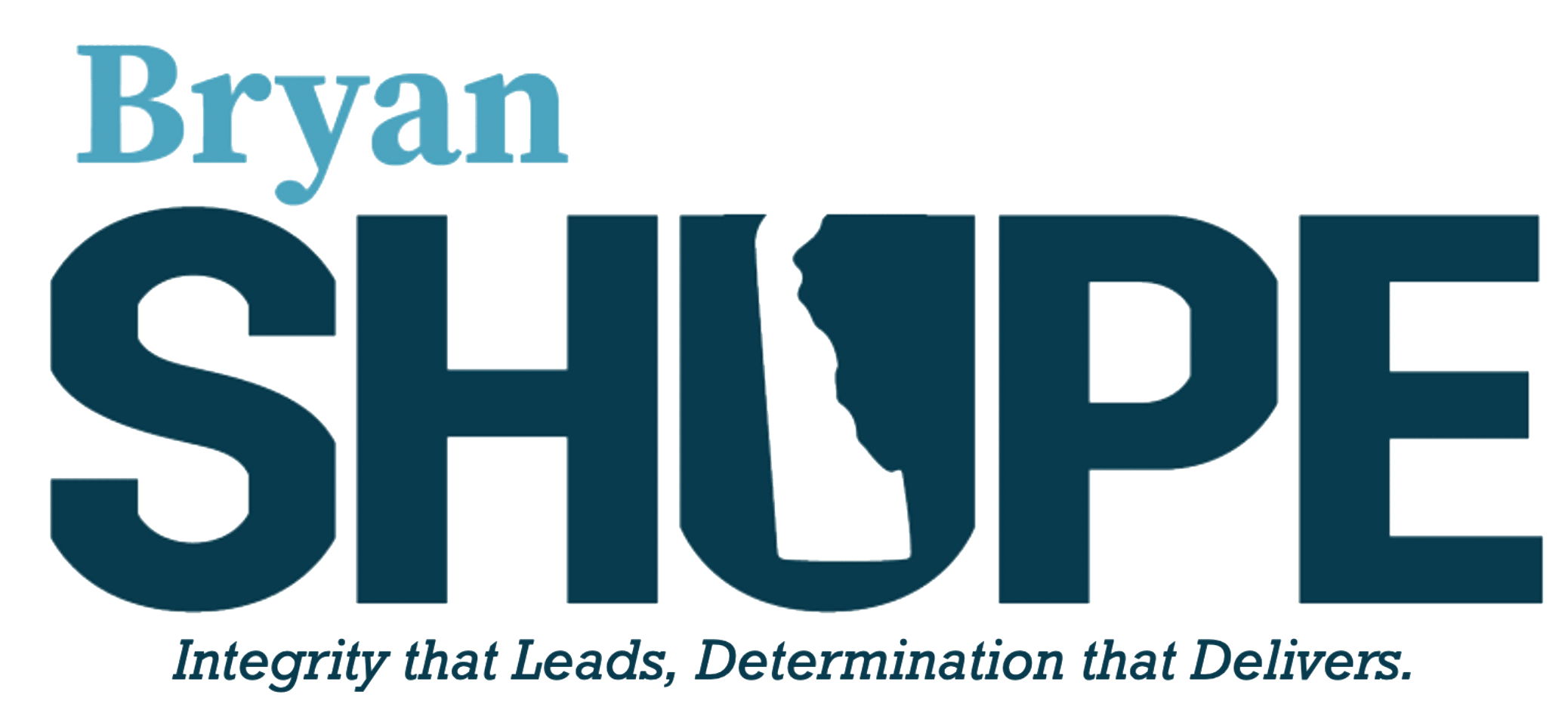With any successful government, business or organization, fiscal responsibility is a cornerstone for a healthy future. As your State Representative I have worked tirelessly to advocate for budget smoothing principles that safeguard against reactionary tax raises and service cuts in the near future and long-term. With every piece of legislation I introduce, fiscal conservatism drives my intentions to create opportunities that do not increase spending and use small amounts of State resources to leverage private and other public funding sources. As the former Mayor of Milford, we balanced four budgets, created financial prudent policies and created a system to collect delinquent taxes, ensuring a stable future for one of Delaware’s fastest growing towns.
Creating Prudent Financial Policies
 For me, fiscal policy is not something that happens during the budget process but an overall philosophy that needs to be adopted by all parts of the organization. During my time as Mayor of Milford, we practiced fiscal prudence through resourcefulness, strategically planning across all departments. With road construction, our public works division planned road repair with replacement of underground water, wastewater or storm water lines. This effort saved the City time and taxpayers’ money, as the same roads were not ripped up multiple times to address different concerns. We also implanted new technology including smart meters and a public utility smart grid that allowed out technicians to proactively approach potential challenges to electric, sewer and water systems. These strategies saved valuable time for our employees and also decreased the cost of reactionary maintenance.
For me, fiscal policy is not something that happens during the budget process but an overall philosophy that needs to be adopted by all parts of the organization. During my time as Mayor of Milford, we practiced fiscal prudence through resourcefulness, strategically planning across all departments. With road construction, our public works division planned road repair with replacement of underground water, wastewater or storm water lines. This effort saved the City time and taxpayers’ money, as the same roads were not ripped up multiple times to address different concerns. We also implanted new technology including smart meters and a public utility smart grid that allowed out technicians to proactively approach potential challenges to electric, sewer and water systems. These strategies saved valuable time for our employees and also decreased the cost of reactionary maintenance.
Collecting Delinquent Taxes
During my first year as State Legislator, I sponsored HB17 that helps our local school districts and local municipalities collect delinquent taxes, giving them priority collection status over other claimant agencies, including surrounding states. Efforts to reevaluate our fiscal policy and procedures will continue to be necessary to protect the investments made by residents and businesses. As Mayor of Milford, I drove an effort to change they City Charter to update an outdated tax delinquency process that left $358,000 on the table in unpaid taxes. Since implementing the new process, over $300,000 has been collected from delinquent payers.
Legislating Through Fiscal Conservatism
 My second Bill during the 150th General Assembly, HB 58, has increased the number of nursing students eligible for the Nursing Incentive Program by expanding its scope to include Delawareans pursuing careers at non-profit hospitals within the state. This was donbe by utilizing existing funds, adding no revenue needs to the Department of Education’s budget.
My second Bill during the 150th General Assembly, HB 58, has increased the number of nursing students eligible for the Nursing Incentive Program by expanding its scope to include Delawareans pursuing careers at non-profit hospitals within the state. This was donbe by utilizing existing funds, adding no revenue needs to the Department of Education’s budget.
Creating efforts to educate and assist low-income families on access to clean water, I introduced HB 210, which establishes a residential drinking water purification system pilot grant program. Working with the Delaware Department of Health, we identified an account that had been specifically set up for low-income assistance but not utilized. When the legislation was delayed, our team decided to partner with the non-profit SERCAP and walked door-to-door in our communities to provide free water testing. Houses that were identified to not have adequate access to safe drinking water were connected to the fund to have the ability to receive water filtration systems. This was all done through no call for increased taxes or revenue from the Department of Health of DNREC.
House Bill 257, a bipartisan effort led by Rep. Benz and me, aims to attract new primary care physicians to the First State. The increase of primary care physicians is not only directly beneficial to the families that these doctors serve but also to the overall system as healthcare costs across the board will be decreased as a result of this program. Primary care physicians are our first line of defense in our healthcare system. Having intimate relationships with their patients, they can meet health challenges before they become overwhelming, chronic and expensive. As the Bill reads, funding for the program leverages matching funds from Delaware’s health insurers and hospitals.
State Government: A Big Spender
According to the Kaiser Foundation, Delaware is #2 in the nation in total state spending per person, and #1 in the lower 48 states. My question is this: do Delawareans feel as though they are getting top-of-the-line value for all of that spending? I would think that most people would say no, and many have said that to me as I’ve knocked on doors in the 36th district. Unfortunately, we have a culture in state government that says if there’s a problem, the only thing that will solve it is more money and more government. But there is no real evidence that more money and more government will help in most cases, and often, it is the exact opposite. I believe that when a problem arises, we should fix the problem, but we should do so at the least expense, and by adding the least amount of government possible.
I commend the Governor of Delaware for advocating saving measures in the annual budget and pushing State legislators to be cautious on spending during years when projected revenue streams increase. As your State Representative I am working diligently with other law makers to reestablish the Budget Smoothing Process that places financially prudent measures into Delaware law to control the growth of government. Delaware’s government should only grow consistent with its private market and large, ongoing programs, offices and positions should not be created strictly because State revenues are climbing. Unsustainable government growth during the good years leads to reactionary tax increases and program cuts during the lean years. This is not only a philosophical theory but has proven true throughout Delaware’s history, most recently in 2017 with the reactionary increase in real-estate transfer tax and a 20% reduction in non-profit organizations like volunteer fire companies and youth programs. This was done to balance a budget that had been handled on an annual basis for years and not responsibly managed with long-term safeguards for success.
“What Gets Measured Gets Managed”
The famous management guru Peter Drucker once said, “What gets measured, gets managed.” Unfortunately, the State’s government programs are not meaningfully measured, and the Joint Finance Committee does not get the metrics they need to justify the spending requests that are made to them for the state budget. It is shameful that we would make budgetary decisions without the relevant reporting on the effectiveness of programs. As your State Representative, I vow to push aggressively to force each state Program Unit to produce meaningful reporting on the metrics of programs.
As Mayor, I took the responsibility of managing our $48 million annual budget very seriously and, together with the City Council, we balanced four budgets without raising taxes. This was done looking to the future as we built our reserves for future infrastructure investments and minimizes outdated practices that no longer served the needs of our community.
In Closing
As public servants, we have a responsibility to offer superior services while striving to let people keep more of what they earn. As your State Representative, I have taken this experience to Dover and work to redirect the course of state government towards a more sustainable future. We spend too much money without getting a good value for it. We fail to adequately measure the results of that spending. And we have an opportunity to make significant


